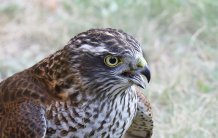Articles

The models would have correctly predicted changes to the range of sparrowhawks
Forecasts help predict future of UK birds
Forecasts which predict how climate change will affect UK birds are improving, new research suggests.
Models have been developed in recent years to predict how the area where a bird species lives – known as its range – will change as the climate does.
The accuracy of these models had never been tested, but the new research by the University of Exeter and the University of Adelaide found they are working well.
“Our findings are a real win for bird conservation in the UK and beyond,” said Dr Regan Early, of the Centre for Ecology and Conservation at the University of Exeter.
“This is because we now have tools that not only better forecast climate-driven range movements, but can be used to target conservation management resources more effectively.”
Dr Early, who heads the Fundamental and Applied Biogeography research group, was part of a team of scientists who tested how accurately different types of ecological models predicted the contraction and expansion of the ranges of 20 UK bird species over the last 40 years.
They found that the latest generation of models, which directly account for important ecological responses to climate change, do much better at forecasting recent range shifts.
For example, the Sparrowhawk has colonised the eastern UK since 1970, and this was captured by sophisticated models that included population growth rates and how far birds travel from where they are born.
Lead author Dr Damien Fordham, from the University of Adelaide, said: “The results show that the enormous effort being invested into improving tools for forecasting the effect of climate change on species range movement and extinctions is working.
“We are now a lot more confident in what models should be used when to provide a more accurate picture of biodiversity loss from climate change.”
The results also have direct consequences for efforts to protect biodiversity.
The research team will now use the models to rank the cost effectiveness of different regional conservation alternatives for birds in the UK this century.
The study, published in the journal Global Change Biology, is entitled: “How complex should models be? Comparing correlative and mechanistic range dynamics models.”
Date: 11 November 2017
